|
July 3, 2018
Recent Developments in Quebec
Crane Operators'
Fight for Their Rights
What Should Crane Operators Do
About Quebec Government's
Provocative Proposal?
PDF

Montreal crane operators rally May 5, 2018.
Recent
Developments
in
Quebec
Crane
Operators'
Fight
for
Their Rights
• What Should Crane Operators Do About Quebec
Government's
Provocative Proposal?
• Role of Monopoly Media in Peddling
Government Anti-Worker Defamation
• The Ugly Face of "Risk Management"
• Workers Support Quebec Crane Operators
Salt Mine Rally in Goderich
• Community Barbecue and Rally Supports
Striking Salt Mine Workers
Lockout Reaches Five
Long Years
• United Steelworkers Local 1005 Holds Picket
at MANA Gates
Recent Developments in Quebec Crane
Operators' Fight for Their Rights
What Should Crane Operators Do About Quebec
Government's Provocative Proposal?

Crane operators rally outside Head Office of the Quebec Construction
Commission,
Montreal, June 21, 2018.
After a week-long job action of refusing to show up for
work, Quebec crane operators returned to their jobs on June 26.
The 1,400 workers, the vast majority members of the Crane
Operators' Union, walked off the job in protest against the
government's unilateral regulatory changes to the qualifications for
their trade. The
Quebec Construction Commission (CCQ) and the Quebec Couillard
government are attempting to impose changes without their consent even
though they are the ones who do the work.
The government has created a framework of illegality,
not that of a polity which has a government of laws where all
individuals,
collectives and factions can sort out their differences and reach a
solution agreeable to all on a peaceful basis which upholds democratic
principle. In other words, even the process should have the agreement
of the
parties involved. Instead, first the government proposes regulations
which the construction companies want. Then, consultations proved to be
phony because they are used to promote defamatory and anti-worker
arguments of the construction monopolies. One claim is that the
workers' defence organizations are a "monopoly" which constitutes a
"mafia." It is common knowledge in the society that this more aptly
describes the construction companies and their collusion with
government, not the workers who defend the standards society has set
for hiring, health and safety, the operation of unions on work sites,
etc.

Then, once the workers are shut out of what is called
the democratic process and take action to defend their health and
safety, they are "illegal." However, the workers' response in defence
of their rights and the rights of all was so categorical, now the
government is squirming. The
fact is that the action of the crane operators was so militant and
such a resounding and eloquent expression of the interests of all
construction workers, not
just crane operators, and it clearly has the support of the public,
that the government is, as we said, squirming. Its "new approach" is
more of the same -- another provocation which the workers reject. The
issue necessarily arises about what they can do about this new
provocation.
The crane operators' union called on members to return
to work following the June 21 decision of an Administrative Labour
Tribunal judge ordering them to do so or face severe individual and
collective punishment. The returning workers were greeted warmly at
construction sites by other construction workers, many of whom had
lost days of pay after they were sent home from those construction
sites unable to continue without crane operators. Several construction
workers told the media that they support the crane operators' struggle
to defend their health and safety, a struggle which also defends the
health and safety of all construction workers and the public.
Following their return to work, Quebec's Minister of
Labour issued a statement, which reads in part:
"[The Minister responsible for Labour] announces that
the Quebec government will meet with the leaders of the Quebec
Federation of Labour (FTQ) to take stock of the illegal strike last
week. A first meeting will be held prior to the construction holidays to
explain
the
nature
of
the
proposed
amendments
to the workforce training
regulation in the construction industry. An independent committee on
the security aspect of the regulation will then be set up to respond to
the concerns of some.... The Quebec government will quickly meet
with the FTQ leaders to review the events of last week and provide
them with the necessary explanations regarding the amendments
to the regulations." (WF emphasis)
The Minister's statement does not say the
government will meet the crane operators' union or even
FTQ-Construction of which the union is a local. The Minister's
declaration rejects the two immediate demands of the crane operators.
Keep in mind that the statement of the ministry talks about "proposed
amendments" even though they
have already been imposed. The crane operators' first demand is that,
given the new regulations reduce the quantity and quality of crane
operator training, they should be withdrawn. Second, a forum or
roundtable should be established, to include all stakeholders in the
construction sector, to calmly review current regulations and establish
new ones
that will improve the safety standards for crane operators within the
changing conditions in the industry, rather than reducing standards as
the new regulations do.
These are sensible proposals for a process which
upholds democratic principle. The government should accept these
proposals and peace can prevail on the construction sites in Quebec.
The government's further provocation, however, suggests
that the crane operators do not understand the new regulations and need
to be informed and educated about them. With this provocation, the
government signals it has no intention of withdrawing the new
regulations, or even modifying them, following a "first meeting" with
the FTQ "to
explain the nature of the proposed amendments" or after the
deliberations of a government-appointed "independent committee" whose
membership has yet to be announced.
|

Safety = Training: CCQ = Danger
|
The crane operators have said from the beginning that
they do not want "explanations regarding the (unilateral) amendments to
the regulations"; they want serious discussions as to how to improve
the regulations to guarantee the health and safety of construction
workers and the public.
Quebec Premier Philippe Couillard and the Minister's
press secretary went further with the provocation. While on a visit to
Washington, DC, Couillard spoke to the press about the new crane
operator
regulations saying, "It's something that's there to simplify the
construction industry, in a good way. There is no evidence that there
is any
impact on the safety of people. Over time, we will see if the issues
they have described actually occur."
In
fact,
there
is plenty of evidence which proves that "the issues they
have described" actually do occur. To pretend no evidence exists of any
impact on safety, and time will see if accidents, which Couillard calls
"issues," occur, is not only unacceptable, it is pathetic. The
regulations in place, which the amendments Couillard is defending
undermine, are there because serious "issues" have already occurred.
Crane operators have long drawn attention to the danger of injuries and
deaths in their trade and to the necessity of the most stringent
regulations governing training and safety on job sites. The
construction sector has the highest rates of workplace injuries and
death in Quebec, and the government is duty bound to end this state of
affairs.
Minister
of
Labour's
press secretary bluntly told the press that there is "no
question of reopening the regulations" regarding the reduced training
of crane operators.
Meanwhile, serious threats are hanging over the heads
of the crane operators and their leaders and union as a result of the
criminalization of their just demands. Huge fines and even possible
jail terms hang over their heads because they did not obey the June 21
Administrative Labour Tribunal order to return to work before June 26.
The Ministry of Transport on June 22 sent a formal notice to the
relevant unions warning them that the Ministry will claim damages
related to what the Administrative Labour Tribunal described as an
illegal strike.
The crane operators are striving to assert the justice
of their cause within a legal space of action where they can have a
voice concerning their working conditions. This space is being denied
to them by the government at the behest of private
interests imposed through the police powers of the state. The police
powers claim to be a
public authority in the service of the public interest but they are
clearly not. The public interest can never be served by negating the
rights of workers and trampling democratic principles in the mud.
In spite of all the evidence and life experience of
construction workers, the government and its agencies declare that
workers have no cause and are acting as criminals and that they should
uphold the democratic peaceful road by capitulating to the state
dictate. All of it is done to sweep under the rug the issues raised by
the workers which
directly affect their well-being and the standards for the entire
society. It must not pass!
A positive intervention is the action of the union
representing the professional instructors who train crane operators,
the Syndicat de l'enseignement des Seigneuries. On June 29, the
union denounced the irresponsible actions of the government and CCQ. It
demands serious discussions be held to find viable solutions and that
those
discussions include crane operators and instructors. The instructors'
union along with the crane operators and their union defend the Diploma
of Vocational Studies, the training standard that has yielded positive
results in reducing the number of deaths and injuries in areas where
cranes are used.
Workers' Forum calls on workers to call members
of the National Assembly, write letters and speak out to express
support for the stand of
the crane operators and to demand that the government and the CCQ step
back and stop the criminalization of workers fighting for their rights
and reach an acceptable agreement on the basis of a process which
upholds
democratic principle.

Role of Monopoly Media In Peddling
Government Anti-Worker Defamation
The role of the monopoly mass media in the context of
the fight of the crane operators for their rights has been to
ceaselessly accuse crane operators of causing millions of dollars in
losses for those who own and control the construction projects due to
their work stoppage. This media pressure to blame and attack the
workers and their
unions for defending their rights and dignity and causing delays must
not be permitted to pass.
 The police powers and mass media
are exerting extreme
pressure on crane operators to "accept" the new regulations without
further resistance. They are being told to accept the bogus
explanations and the Couillard government's "independent committee" and
stop any resistance, or face even greater state-organized repression.
How will this help
resolve either the dangers posed to health and safety or the problem of
governments which think they can trample democratic principle and get
away with it? One hopes all the unions would make statements against
this modus operandi. As for the political parties in the Quebec
National Assembly, without exception they have bought into
the nonsense that the workers' demands cause the problems on
construction sites. It is not acceptable. The police powers and mass media
are exerting extreme
pressure on crane operators to "accept" the new regulations without
further resistance. They are being told to accept the bogus
explanations and the Couillard government's "independent committee" and
stop any resistance, or face even greater state-organized repression.
How will this help
resolve either the dangers posed to health and safety or the problem of
governments which think they can trample democratic principle and get
away with it? One hopes all the unions would make statements against
this modus operandi. As for the political parties in the Quebec
National Assembly, without exception they have bought into
the nonsense that the workers' demands cause the problems on
construction sites. It is not acceptable.
This media pressure and the consensus in the National
Assembly to blame and attack the workers and their unions for defending
their rights and dignity and causing delays on important projects and
damage to the economy must not be permitted to pass. Many have
denounced the media's role by pointing out the irony of a
government citing concern with cost overruns on construction projects.
Such delays and cost overruns are commonplace in an industry known for
collusion, and even corruption between government and construction
monopolies, resulting in huge profits for the private interests in
control.

The Ugly Face of "Risk Management"
Quebec Premier Couillard, speaking in Washington, DC
about the new regulations imposed on crane operators, said, "It's
something that's there to simplify the construction industry, in a good
way. There is no evidence that there is any impact on the safety of
people. Over time, we will see if the issues they have described
actually occur." With this he has raised the ugly face of "risk
management" as a mantra of the anti-social offensive of the rich. They
introduce anarchy coupled with violence. They endanger the lives of all
with their destructive neo-liberal frenzy to seize what belongs to the
workers by right and say the "risks" are acceptable. A criminal logic
indeed.
Only the ugly anti-social interests of the rich speak
in this way, as if human beings are pieces in a casino stock market
whose lives are subjected to the risks managed to profit a few
parasites. In the twenty-first century, above all else the active and
conscious participation of those who do the work is necessary in
determining proper working conditions.
The Lac-Mégantic train tragedy, whose fifth
anniversary the country is marking, was a result of risk management in
the name of profit and productivity. The issues workers constantly
raise are ignored until disaster strikes. Couillard is doing just that,
but it will not do. The working class must come together with one voice
to intervene and force the government and Quebec Construction
Commission to reverse the untenable
position they have put crane operators into with this dictate and
police powers.

Workers Support Quebec Crane Operators
Workers' Forum has received expressions of
support from workers for the Quebec crane operators in their struggle
to defend their rights. This includes the basic right to healthy and
safe working conditions and for their work to be carried out in the
strictest conditions with regards to the safety of the public.
 A mechanic from the
trucking industry tells us: A mechanic from the
trucking industry tells us:
"It's clear to me that the government is using the
pretext of a labour shortage to reduce the hours of training for crane
operators. That's too simple. If the government is allowed to get away
with this pretext with the crane operators who could stop them for
using the same pretext against other workers? If there is a shortage of
manpower, then
we have to deal with it, but this is not the way. How can measures such
as lowering safety standards be an acceptable way to increase the
number of crane operators? According to this logic, there can be a
double standard, two categories of crane operators, two levels of
training, depending on the availability of labour! It does not make
sense.
There must be the highest standards at all time and under all
circumstances, not just when it suits employers!"
A worker in the food industry told one of our
journalists:
"I find the silence of the Labour Standards,
Pay Equity and Workplace Health and Safety Board (CNESST) disturbing.
How can a government institution whose purpose is to ensure workplace
safety be silent on this issue? Is this a sign of a stranglehold of the
Liberal government on the Board? If so, these government institutions
no
longer have any independence from the executive branch and the
political party in power and that is really disturbing. Which public
body will defend us now? The government wants to give private companies
all the power to regulate everything and the public authorities refuse
to play their role. It's a serious problem."
The following comment came from a Canadian Pacific
worker:
"What's going on really does not make sense.
We have to find a way to stop them. Here, at Canadian Pacific, in the
rail industry, health and safety standards and training are
deteriorating very quickly. I am the perfect example. Just a few months
ago, I was a clerk responsible for responding to intermodal truckers
who came to bring their
containers to our terminal. I was sitting behind a computer. Now, CP
management is using new technology that allows truckers to do the job
themselves. So I was moved into the yard to drive the huge hydraulic
cranes that stack the containers and load the trains. I received
minimal training and this training took place in the circumstances of
restructuring of the company and an increase in volume at the terminal
because of the economic boom. My stress level is still very high
despite all the help I get from my colleagues who are more experienced
than I am. I cannot tell you the number of mistakes I have made or
about the perilous situations that could have put the lives of workers
at
stake. I know people who used to work in various jobs who have been
transferred to work as locomotive engineers, imagine. Big companies
like CP have become so powerful that not only do they treat us like
this, but they dictate what governments should do. We have to find a
way to stop them."
This comment came from a trucker:
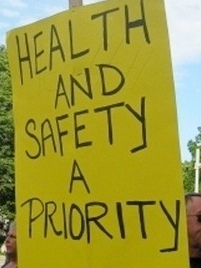 "We truckers have a long
history of corporate training.
It can be summed up in a few words: 'You are on your own!' I am
serious. In the field of transportation for the last several decades
people have been told to learn on the job. If an accident occurs, you
are blamed for having done something wrong, for not following
procedures. Most
companies believe that if we have a class one license, that is the
class required to drive all heavy vehicles, we are supposed to know
everything. That's far from being the case. The variety of conditions
and multiple transport companies, not to mention the type of transport,
makes each situation different. There are no mandatory minimum
standards for truckers. The courses offered in subsidized private
schools, which provide a full five-month course, are not mandatory. I
attended a small 12-hour course in an unsubsidized school and my
start in the profession was very difficult. When you are employed by a
company and you ask for a minimum of training, you are read a
procedure that you must sign and that is supposed to mean that you have
been trained. We are considered responsible for our safety because we
have read and signed a piece of paper. That's not what I call training.
I wholeheartedly support the crane operators. We must not retreat even
an inch on our health and safety. We workers want to defend
the highest standards and we all take that responsibility as seriously
as the crane operators do. We must resist in every way we can
government or corporate attempts to make decisions that concern us and
put us at risk." "We truckers have a long
history of corporate training.
It can be summed up in a few words: 'You are on your own!' I am
serious. In the field of transportation for the last several decades
people have been told to learn on the job. If an accident occurs, you
are blamed for having done something wrong, for not following
procedures. Most
companies believe that if we have a class one license, that is the
class required to drive all heavy vehicles, we are supposed to know
everything. That's far from being the case. The variety of conditions
and multiple transport companies, not to mention the type of transport,
makes each situation different. There are no mandatory minimum
standards for truckers. The courses offered in subsidized private
schools, which provide a full five-month course, are not mandatory. I
attended a small 12-hour course in an unsubsidized school and my
start in the profession was very difficult. When you are employed by a
company and you ask for a minimum of training, you are read a
procedure that you must sign and that is supposed to mean that you have
been trained. We are considered responsible for our safety because we
have read and signed a piece of paper. That's not what I call training.
I wholeheartedly support the crane operators. We must not retreat even
an inch on our health and safety. We workers want to defend
the highest standards and we all take that responsibility as seriously
as the crane operators do. We must resist in every way we can
government or corporate attempts to make decisions that concern us and
put us at risk."

Salt Mine Rally in Goderich
Community Barbecue and Rally Supports
Striking Salt Mine Workers

A community barbecue and rally was held on June 28
for the 350 striking workers at the Compass Salt Mine in Goderich,
Ontario. The rally took place at Harbour Park overlooking Lake Huron
from where massive lake freighters deliver the mined salt to much of
the Great Lakes region. The workers who are members of Unifor
Local 16-0 have been on strike since April 27 over the
company's demand for concessions and onerous overtime conditions, which
the workers have refused to accept. Local civic officials and community
members came out to show their support for the striking workers.
Several busloads of Unifor members and retirees from across the
province travelled to Goderich to express their solidarity.
Compass Minerals, a large supranational corporation
headquartered in the "right to work" state of Kansas bought the mine --
the largest salt mine in the world -- in 1990. It boasts a daily
production of 25,000 pounds of road salt, which is stockpiled for
anticipated demand during winter.
Union representatives at the rally noted that Compass
Minerals declared a stock dividend of $90 million recently and its
CEO receives about $3.5 million per year. Unifor 16-0 points
out that the U.S. corporation is seeking to make overtime mandatory up
to 70 hours per week along with other concessions, some of
which are even in violation of the current Employment Standards Act. In
addition to opposing concessions, workers demand the appointment of a
full-time safety representative to deal with the unacceptable level of
accidents at the mine, including a fatality.
The speeches at the rally denounced Compass for
bringing in scab mercenaries from as far away as New Brunswick to keep
the mine producing during the legal strike. Unifor announced a
President's Conference at the Unifor Education Centre in nearby Port
Elgin where discussions will be held on how to deal with the company's
anti-worker
activity and to plan actions to intervene in the strike on a
province-wide basis. The union is considering mobilizing its flying
squads to put an end to the use of scabs to prolong the strike.
For further information read the May 22 article in
Workers'
Forum "Compass
Mineral Workers in Goderich, Ontario, on Strike against Anti-Worker
Concessions."

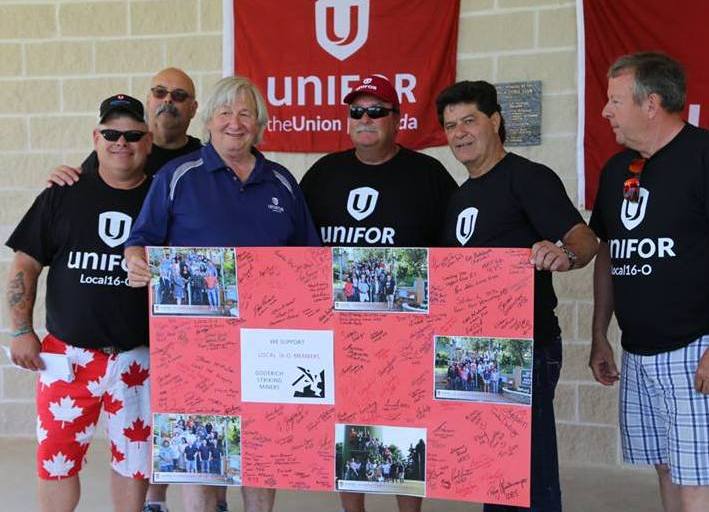 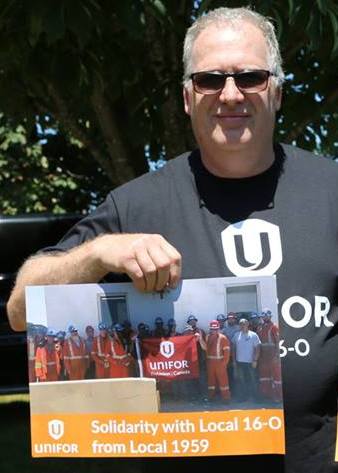

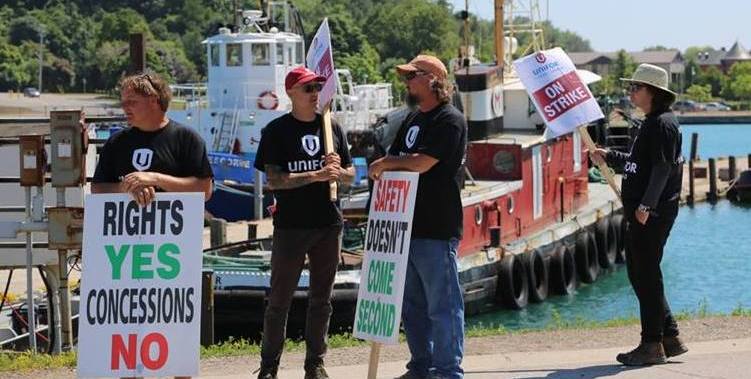

Lockout Reaches Five Long Years
United Steelworkers Local 1005 Holds Picket
at MANA Gates
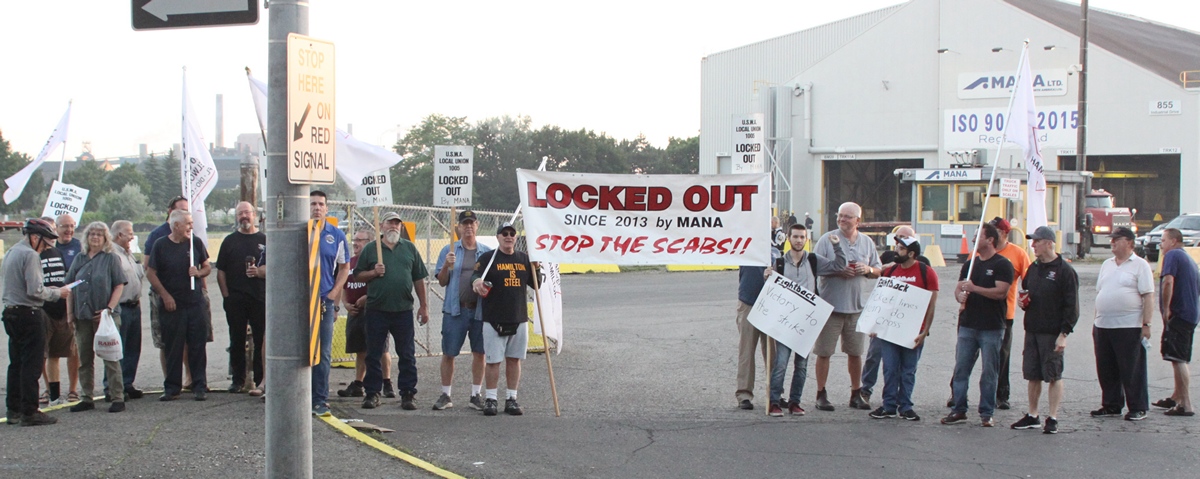
At
5:00
am
on
June
29,
members
of
USW Local 1005 and their supporters brought
their banners and flags to the MANA gates to mark the fifth anniversary
of being locked out by the German company Max Aicher North America
(MANA) in June 2013.
U.S.
Steel
sold
MANA
its
bar
and
bloom
mill in 2010. The provincial and
municipal governments along with the media praised this as a boon to
the local steel industry and economy. However MANA subsequently stopped
production in September 2011 and by December 2012, it had laid off the
entire work force. It then demanded unacceptable concessions during
contract negotiations, including a 30 per cent wage cut, no
cost-of-living allowance and the replacement of the defined benefit
pension
plan with a defined contribution plan. The workers turned down the
offer by a
vote of 73 per cent and another offer by 86 per cent. MANA then locked
workers out in June 2013. In January 2015, it began running the mill
using
scabs. The courts issued an injunction limiting the time the workers
could delay the scabs from entering the plant, but the entire
anti-worker bias of the government, courts, media and even educational
institutions such as Mohawk College which has been providing scab
labour, remains in place.
MANA
bought
the
plant.
It
knew
what
it
was getting. Despite this it is
permitted to deprive workers of their livelihood and the blame falls on
the workers! All they have to do is accept slave conditions and they
can work, the argument goes. It is good for the economy because the
owners can make super profits, the argument goes. It is
outrageous! It is high time the argument that Ontario is open for
business and the workers of Ontario be damned has got to go.
Workers'
Forum
salutes the MANA workers and considers their stand to be very
courageous. For five years, day in and day out, they have persisted in
fighting for the justice of their cause in a manner which upholds the
dignity of labour against all odds. They have defied the attempt of
ruling elites to trample their rights into
the mud and get away with these anti-worker stands with impunity. They bring honour to
the Ontario and Canadian working
class.
It
is
a
courageous
united
stand
that
deserves
the unstinting support of
all workers and collectives of workers. Congratulations to all the
workers at MANA and USW Local 1005 who persist in upholding the dignity
and rights of labour!



PREVIOUS
ISSUES | HOME
Website: www.cpcml.ca
Email: office@cpcml.ca
|

